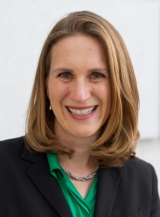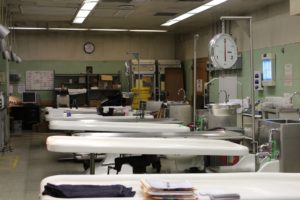Today, SevenPonds completes our interview with Judy Melinek, M.D., a forensic pathologist who does autopsies for the Alameda County Sheriff Coroner’s Office in California. (Read part one of the interview here.) Dr. Melinek has a bachelor’s degree from Harvard and a medical degree from the University of California, Los Angeles. She is also the author of Working Stiff: 262 Bodies and the Making of a Medical Examiner, which was co-authored by her husband, writer T.J. Mitchell, and the CEO of Pathology Expert, Inc.

Credit: Pathologyexpert.com
Debra: How do you deal with family members who object to an autopsy based on religious or cultural beliefs?
Judy: State law defines whether a coroner or medical examiner is required to consider a religious exemption request. In general, we try to honor these beliefs as long as they don’t interfere with a criminal investigation. If the death appears natural and there is no evidence of foul play, then in some cases we won’t insist on performing an autopsy over the family’s objections; though in these cases, we may have no choice but to certify the cause of death as undetermined, which can complicate inheritance or insurance payments.
Debra: How do you handle cases where the dead loved one needs to be viewed for identification?
Judy: Visual identification of deceased loved ones is usually done at the scene, but if it cannot be done at the scene, then generally we don’t ask families to come to the morgue to identify the loved one. In my training, we would show photographs to the family in cases where a visual identification was needed. But in most cases we try to identify the body using reliable scientific means such as fingerprints or dental x-rays. In cases where the loved one does not have prior fingerprint or radiographic records, then the family may be contacted for exemplars that can be used in DNA analysis.
Debra: What can you do to make the medical examiner experience easier for the family?
Judy: I am bound to do a thorough and complete job in a timely fashion, and I take that responsibility seriously. Many families want answers right away, but sometimes workload or the individual characteristics of a complex case make it difficult to be speedy. I resolve most of my cases in about a month, but there have been several that have taken me over a year. In some of these, we couldn’t track down medical records. In others, our office was waiting for other agency reports or advanced laboratory testing in order to help us determine the cause or manner of death. In all cases that take longer, I try to keep in touch with the family and keep them appraised of my findings with an explanation about what I am doing and what I am waiting for.

Credit: sfearthquakesafety.org
Debra: How does an autopsy affect the funeral?
Judy: In most cases an autopsy examination should not affect the funeral other than to delay it by a day or two. If the family is Jewish or Muslim and needs the autopsy to be expedited in order to meet a requirement for a speedy funeral, they ought to inform the coroner or medical examiner and arrangements can be made to accommodate them. An open or closed casket depends more on the condition of the dead loved one prior to the autopsy. Penetrating facial trauma and decomposition are the most common reasons why a family might opt for a closed casket. These decisions are often made in consultation with the mortician or funeral home staff.
Debra: Judy, I’d like to thank you for your time and your thoughtful answers.
Judy: You’re welcome, Debra.

 How Can a Family Best Work with a Coroner or Medical Examiner? Interview with Judy Melinek, Part Two
How Can a Family Best Work with a Coroner or Medical Examiner? Interview with Judy Melinek, Part Two


 Our Annual Seven Holiday Gifts for Someone Who Is Grieving, 2024 Edition
Our Annual Seven Holiday Gifts for Someone Who Is Grieving, 2024 Edition
 “Making Mobiles” by Karolina Merska
“Making Mobiles” by Karolina Merska
 “Hands Up to the Sky” by Michael Franti & Spearhead
“Hands Up to the Sky” by Michael Franti & Spearhead














